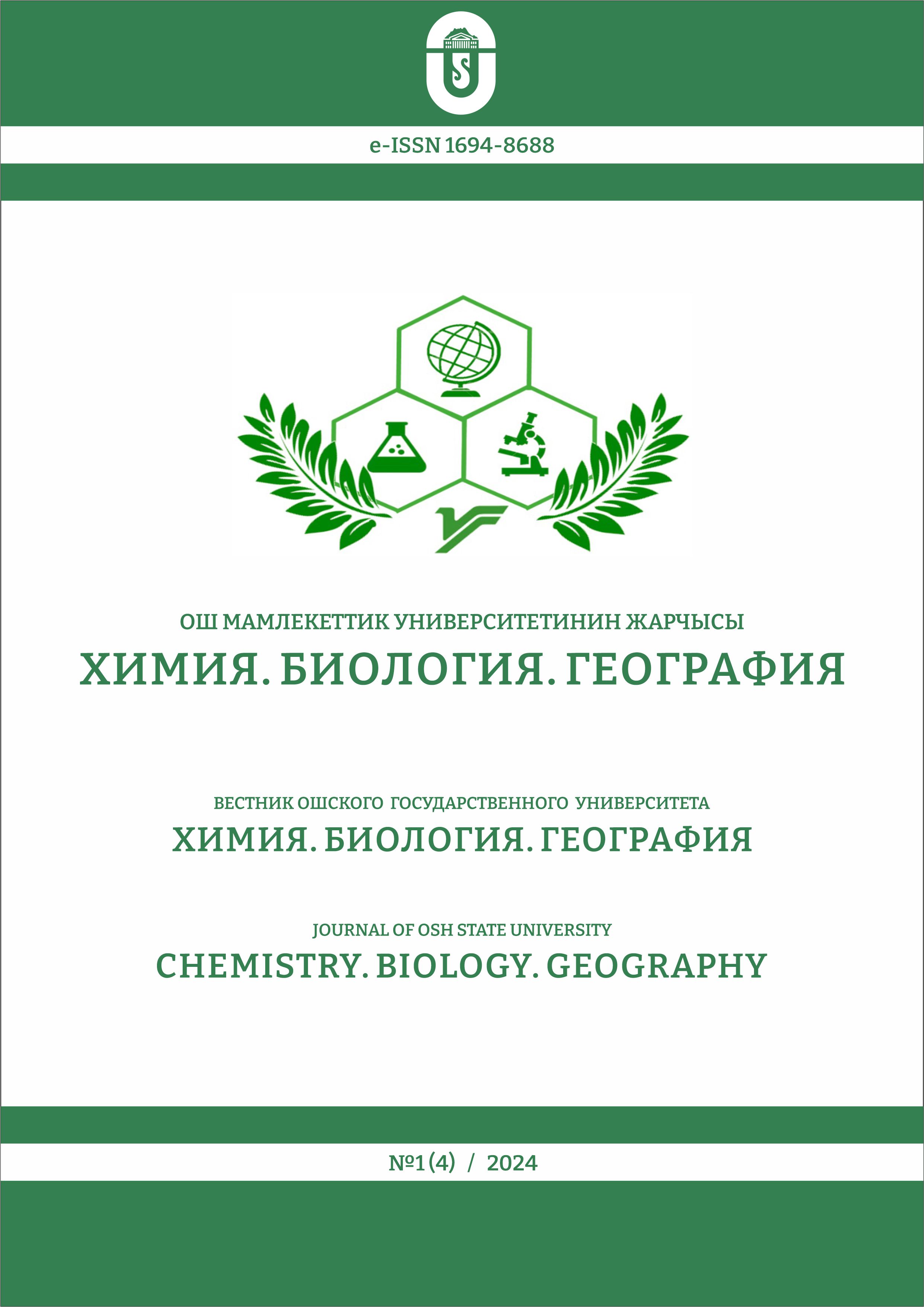RADIOECOLOGICAL RESEARCHE OF THE SOILS OF NATURAL AND MAN-MADE ECOSYSTEM OF THE ISSYK-KUL REGION
DOI:
https://doi.org/10.52754/16948688_2024_1(4)_23Keywords:
soil, radionuclides, radiation background, tailings storage, reclamation, радиациялык фонAbstract
The article presents the results of radioecological researches of soils in the natural-technogenic ecosystems of the Issyk-Kul region. The physico-geographical location and geological structure of the Issyk-Kul basin largely determine it as a province with an elevated concentration of natural uranium, formed due to the dispersion of uranium from weathered rocks and granites and its accumulation in sedimentary rocks and soils. Among the technogenic sources of radioactivity in the region is the tailings repository of radioactive coal processing in the village of Kadji-Sai. It is located on the southern coast of Lake Issyk-Kul which was remediated in 2019 as part of the international program "Reclamation of territories of the Eurasian Economic Union countries affected by uranium mining operations." The remediation of the Kadji-Sai tailings repository has made a significant contribution to radiation safety. In 2023 radioecological researches showed that the level of radiation background and the specific activity of radionuclides in the soil of the region changes within normal limits.
References
Жолболдиев Б.Т. (2016) Радиоэкологическая оценка загрязнения территории бывшего уранового производства Каджи-Сай (Биосферной территории Иссык-Куль) (диссертация канд. биол. наук), Биолого-почвенный институт НАН КР, Бишкек.
Закон КР (2011). Технический регламент «О радиационной безопасности». https://base.spinform.ru/show_doc.fwx?rgn=48390
Ковальский В.В., Воротницкая И.Е., Лекарев В.С. (1968). Урановые биогеохимические пищевые цепи в условиях Иссык-Кульской котловины. Труды Биогеохимической лаборатории, т. 12, сс.25-53.
Наквасина Е. Н., Земцовская О. Н., Денисова А. И. (2014). Использование злаковых трав для биологической рекультивации нарушенных земель Севера, Arctic Environmental Research, сс.81-89. https://cyberleninka.ru/article/n/ispolzovanie-zlakovyh-trav-dlya-biologicheskoy-rekultivatsii-narushennyh-zemel-severa
Осмонбаева К.Б., Калдыбаев Б.К., Усупбаев А.К. (2023). Злаковые травы для биорекультивации района хвостохранилища Каджи-Сай, Известия Ошского технологического университета, № 2-2, сс. 106-114. https://elibrary.ru/item.asp?id=54753568
Сариев А. Х., Чербакова Н. Н., Терентьева Н. Ю. (2021). Восстановление почвенно-растительного покрова нарушенных тундровых земель. Вестник КрасГАУ, № 7, сс. 73-81. DOI: 10.36718/1819-4036-2021-7-73-81.
Семина И. С. (2014). О рекультивации нарушенных земель на разрезах Кузбасса. Горный информационно-аналитический бюллетень, №12, сс. 307 - 315.
Analytical Methodology for the Determination of Radium Isotopes in Environmental Samples. IAEA Analytical Quality in Nuclear Applications Series, 19 (2010). Available at: https://www-pub.iaea.org/MTCD/Publications/PDF/IAEA-AQ-19_web.pdf
Djenbaev B.M., Kaldybaev B.K., Zholboldiev B.T., Karmisheve U.Sh., Shumaliev T., Dikanov K. (2020). Gamma Radiation of Radionuclide in The Mountain Areas of Former Uranium Production Facilities (Kyrgyzstan). Journal of Physical Science and Environmental Studies, 6 (1) (2020), pp. 11-22. Available at: https://doi.org/10.36630/jpses_19012
Dogan I., Ozyigit I., Kidiraliyeva B., Cekirov K., Kurmanbekova G., Ucar B., Saykieva N., Hocaoglu-Ozyigit A, Ertugrul Yalcin I., Severoglu Z., Solak A. (2021). Assessment of pollution at the former uranium waste dumpsite near Kaji-Say Village/Kyrgyzstan: a genetic and physiological investigation. Journal of Environmental Radioactivity, 14 (1), pp. 280-294. Available at: https://doi.org/10.1080/16878507.2021.1957397
Gavshin V.M., Melgunov M.S., Sukhorukov F.V., Bobrov V.A., Kalugin I.A., Klerkx J. (2005). Disequilibrium between uranium and its progeny in the Lake Issyk-Kul system (Kyrgyzstan) under a combined effect of natural and manmade processes. Journal of Environmental Radioactivity, 83 (1), pp. 61-74. Available at: https://doi.org/10.1016/j.jenvrad.2005.02.012
Gavshin V.M., Sukhorukov F.V., Bobrov V.A., Melgunov M.S., Miroshnichenko L.V., Klerkx J., Kovalev S.I., Romashkin P.A. (2004). Chemical composition of the uranium tail storages at Kadji-Sai (Southern shore of Issyk-Kul Lake, Kyrgyzstan). Water, Air, & Soil Pollution, 154, pp. 71-83. Available at: https://doi.org/10.1023/B:WATE.0000022929.61233.84
Kulenbekov Z., Merkel B.J. (2012). Investigation of the natural uranium content in the Issyk-Kul Lake, Kyrgyzstan. FOG - Freiberg Online Geoscience, 33, pp. 3-45. https://tu-freiberg.de/sites/default/files/2023-08/fog_volume_33_0.pdf
Lespukh E., Stegnar P., Usubalieva A., Solomatina A., Tolongutov B., Beishenkulova R. (2013). Assessment of the radiological impact of gamma and radon dose rates at former U mining sites in Kyrgyzstan. Journal of Environmental Radioactivity, 123, pp. 28-36. Available at: https://doi.org/10.1016/j.jenvrad.2012.11.013
Lind O.C., Stegnar P., Tolongutov B., Rosseland B.O., Stromman G., Uralbekov B., Usubalieva A., Solomatina A., Gwynn J.P., Lespukh E., Salbu B. (2013). Environmental impact assessment of radionuclide and metal contamination at the former U site at Kadji Sai, Kyrgyzstan. Journal of Environmental Radioactivity, 123, pp. 37-49. Available at: https://doi.org/10.1016/j.jenvrad.2012.07.010
Liu W., Ma L., Li Y., Abuduwaili J. (2020). Heavy Metals and Related Human Health Risk Assessment for River Waters in the Issyk-Kul Basin, Kyrgyzstan, Central Asia. International Journal of Environmental Research and Public Health, 17 (10), p. 3506. Available at: https://doi.org/10.3390/ijerph17103506
Lubna A. Al-Asadi. (2018). Gamma Background Radiations and Measurements with Applications. Available at: https://www.intechopen.com/books/8352
Oughton D.H., Strømman G., Salbu B. (2013). Ecological risk assessment of Central Asian mining sites: application of the ERICA assessment tool. Journal of Environmental Radioactivity, 123, pp. 90-98. Available at: https://doi.org/10.1016/j.jenvrad.2012.11.010
Soil sampling for environmental contaminants. IAEA-TECDOC-1415, (2004). Available at: https://www-pub.iaea.org/MTCD/Publications/PDF/te_1415_web.pdf
Strategic Master Plan for Environmental Remediation of Uranium Legacy Sites in Central Asia, (2021). Available at: https://www.iaea.org/sites/default/files/18/05/strategic_master_plan_v1_may_2018.pdf
Torgoev I.A., Aleshyn U.G. (2004). Ecological Risk in Territory Uranium Tailing of Kyrgyzsta. Environmental Protection Against Radioactive Pollution, pp. 57-64. Available at: https://www.researchgate.net/publication/225311757_Ecological_Risk_in_Territory_Uranium_Tailing_of_Kyrgyzstan
Uralbekov B.M., Smodis B., Burkitbayev M. (2011). Uranium in natural waters sampled within former uranium mining sites in Kazakhstan and Kyrgyzstan. Journal of Radioanalytical and Nuclear Chemistry, 289 (3), pp. 805-810. Available at: https://doi.org/10.1007/s10967-011-1154-3
Downloads
Published
How to Cite
Issue
Section
License
Copyright (c) 2024 Journal of Osh State University. Chemistry. Biology. Geography

This work is licensed under a Creative Commons Attribution-NonCommercial 4.0 International License.

